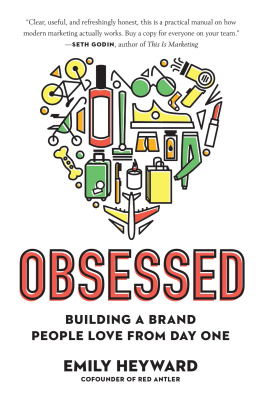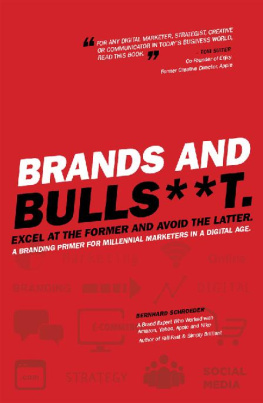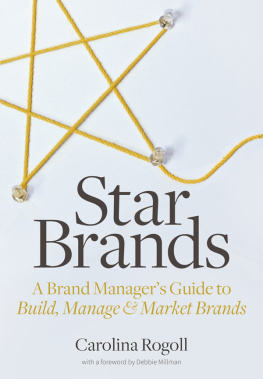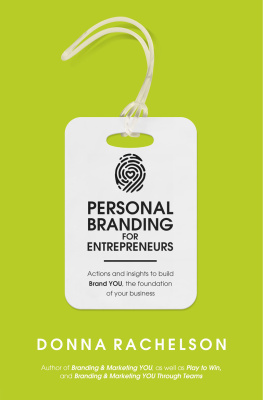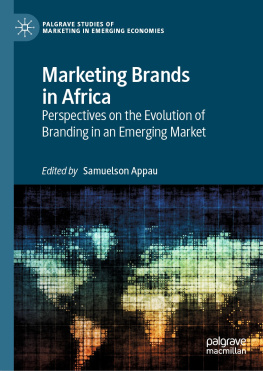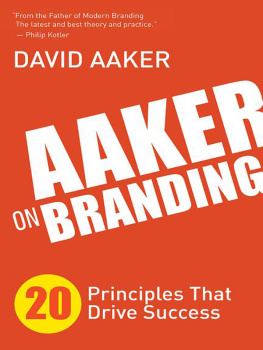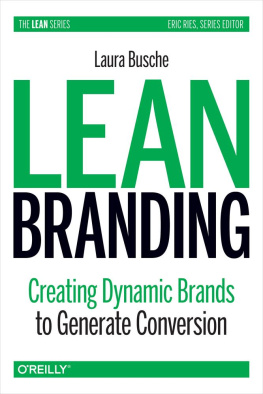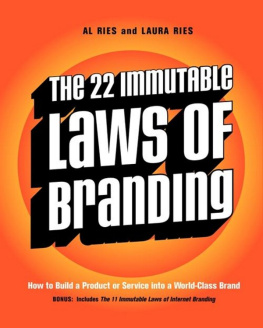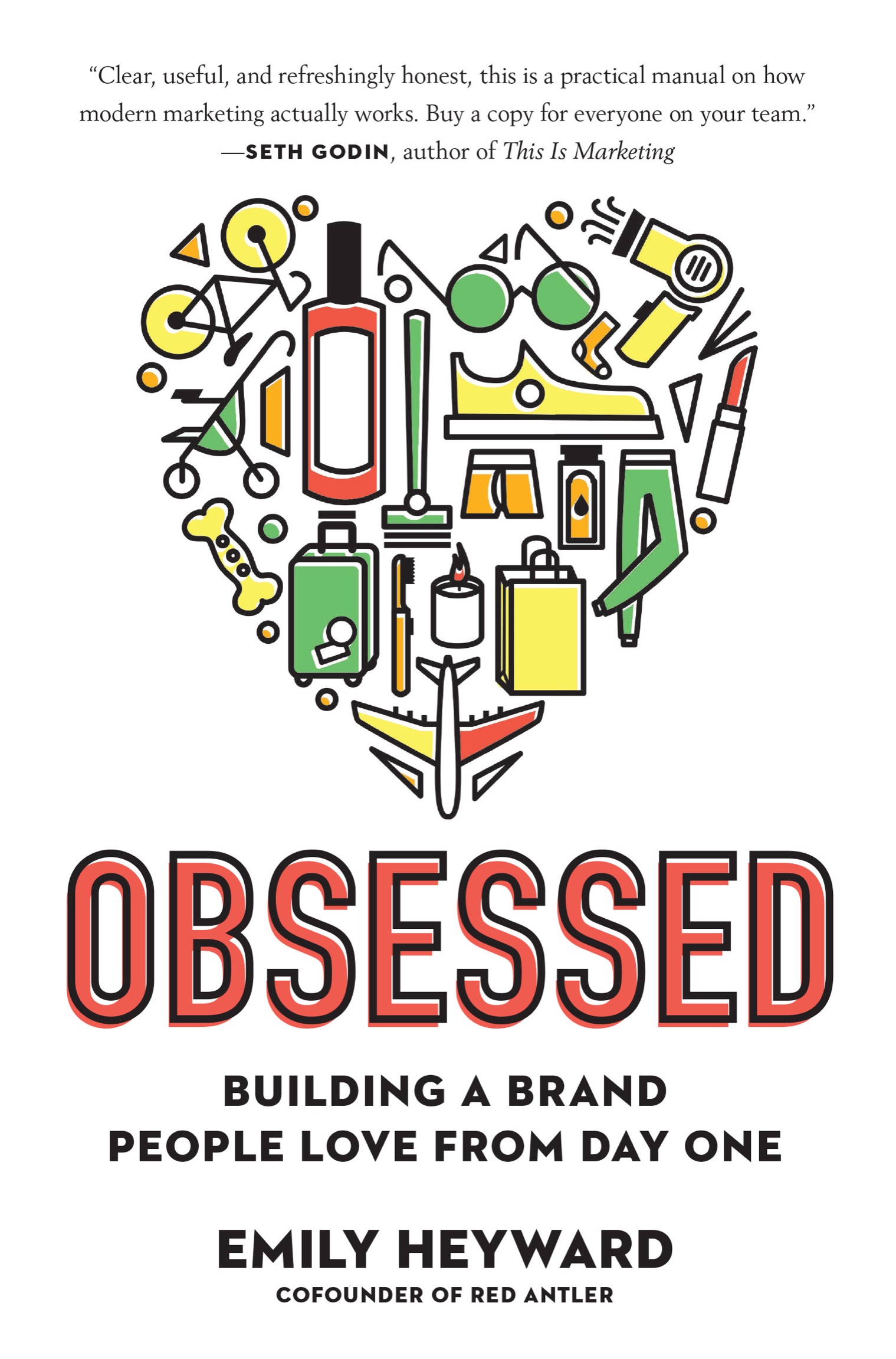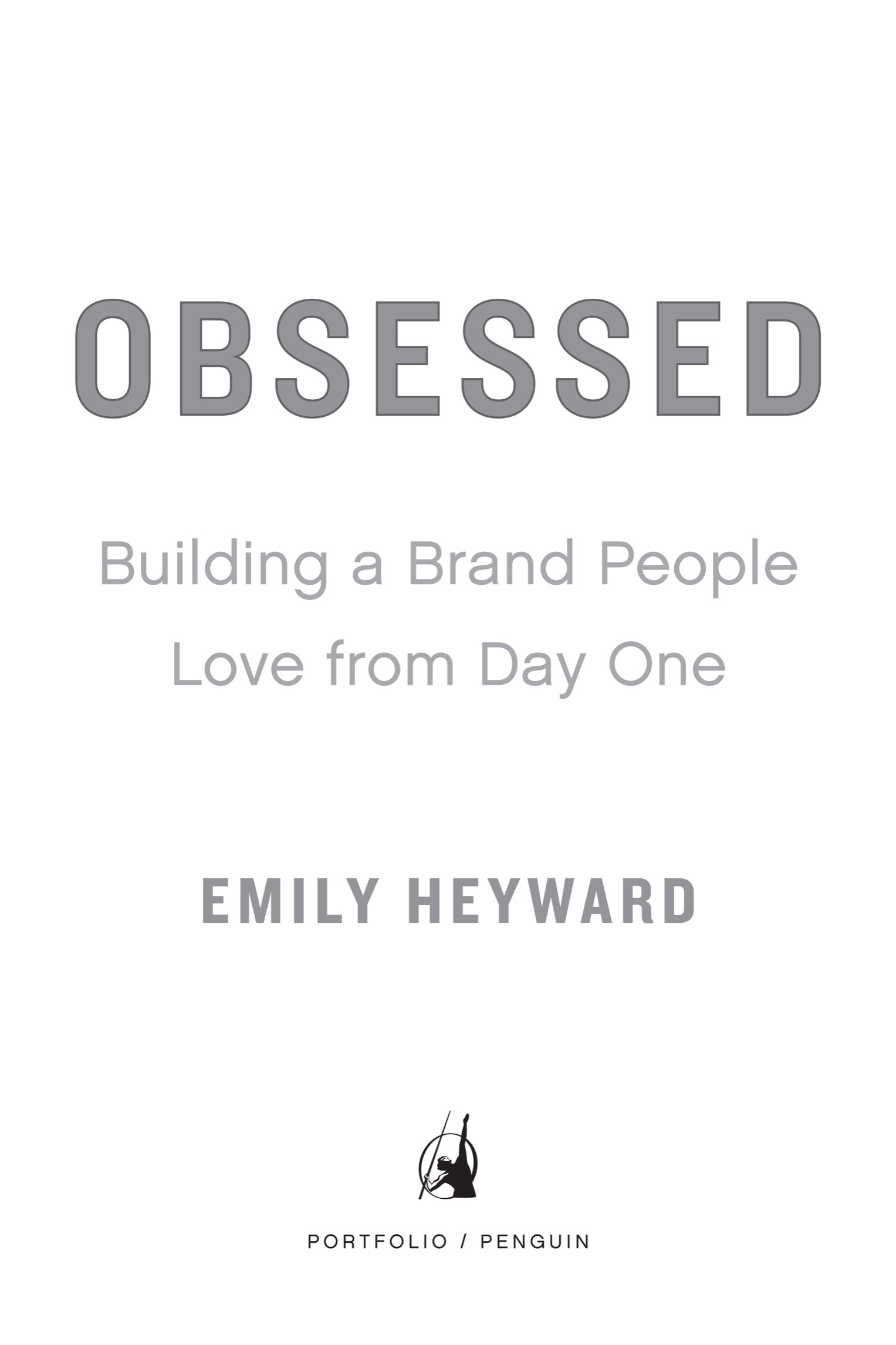PRAISE FOR OBSESSED
A lucid and engaging playbook on why brand is the most fundamental, human, and engaging element of any great venturewhy its the business DNA, and not just the representation of it. Obsessed keeps you anchored to the raison detre!
David Bell, cofounder and president, Idea Farm Ventures
Were all prey to our obsessions. (Yes, even you). Ready to find out why? This book will show you.
Sally Hogshead. New York Times bestselling author of How the World Sees You and Fascinate
Clear, useful, and refreshingly honest, this is a practical manual on how modern marketing actually works. Buy a copy for everyone on your team.
Seth Godin, author of This Is Marketing
I look to invest in campanies with promising new models and a focus on brand that starts with a true understanding of the consumer. Emily Heywards book is a fascinating look into how branding really works and why it matters.
Kirsten Green, founding partner, Forerunner Ventures
When we started Casper, our brand strategy affected every decisionand in this book, Emily Heyward shows you how. Anyone starting a company should read this.
Philip Krim, cofounder and CEO of Casper
The startup landscape is always shifting, but across every category were looking to invest in people who understand the power of brand. This book, with Emilys valuable advice, is essential for getting it right.
Ben Lerer, managing partner at Lerer Hippeau and CEO of Group Nine Media
Obsessed is a clear, informed blueprint founders and marketers can use to craft a resilient brandone that will not only break new ground, but inspire an unforgettable customer connection.
Nir Eyal, bestselling author of Hooked and Indistractable
Nobody understands the development of modern brands better than Emily Heyward. In Obsessed, Heyward illuminates the DNA of brands that move us and enhance our daily lives. By surgically deconstructing the art of branding and the lessons we must learn, Heyward outfits us to be brand builders and stewards that transform products and industries.
Scott Belsky, founder of Behance and author of The Messy Middle
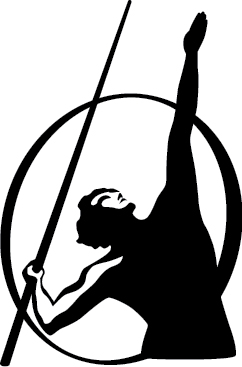
PORTFOLIO / PENGUIN
An imprint of Penguin Random House LLC
penguinrandomhouse.com
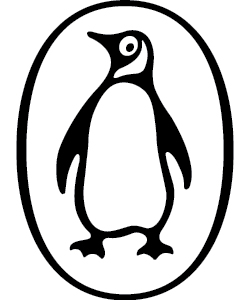
Copyright 2020 by Emily Heyward
Penguin supports copyright. Copyright fuels creativity, encourages diverse voices, promotes free speech, and creates a vibrant culture. Thank you for buying an authorized edition of this book and for complying with copyright laws by not reproducing, scanning, or distributing any part of it in any form without permission. You are supporting writers and allowing Penguin to continue to publish books for every reader.
LIBRARY OF CONGRESS CATALOGING-IN-PUBLICATION DATA
Names: Heyward, Emily (Chief brand officer), author.
Title: Obsessed : building a brand people love from day one / Emily Heyward.
Description: New York : Portfolio / Penguin, [2020] | Includes index.
Identifiers: LCCN 2019059648 (print) | LCCN 2019059649 (ebook) | ISBN 9780593084311 (hardcover) | ISBN 9780593084328 (ebook)
Subjects: LCSH: Branding (Marketing) | Creative ability in business. | Success in business.
Classification: LCC HF5415.1255 .H49 2020 (print) | LCC HF5415.1255 (ebook) | DDC 658.8/27dc23
LC record available at https://lccn.loc.gov/2019059648
LC ebook record available at https://lccn.loc.gov/2019059649
Cover design: Jennifer Heuer
pid_prh_5.5.0_c0_r0
For Michelle
Best friends forever, baby
CONTENTS
AUTHORS NOTE
Throughout the book, Ive indicated the companies with whom Ive worked closely as clients of Red Antler. The other examples are drawn from my observations as a brand builder and consumer, but I have no direct relationship to them. In both cases, the book is filled with companies whose stories are still being written. Some will inevitably experience failure, and some may experience scandal (a few already have). In the course of writing the book, I had to go back and edit chapters as a founder came under fire or a boycott erupted, but Im not going to be able to pull the book off shelves and scribble in future updates. Such is the risk of writing a book about modern brands in real time. Ive chosen companies that I admire because they represent universal principles of brand building, but brands are run by people, and people continue to be imperfect, even within the idealistic promises of todays startup culture. All of this is to say that I am not endorsing any bad behavior, past, present, or future, by the teams that Ive included. But please, founders, just be good, okay?
INTRODUCTION
You dont need to work in venture capital or graduate from Stanford business school to recognize that were in the midst of a consumer startup revolution. Scroll through your Instagram feed, and youre more likely to see a beautiful, compelling ad from a brand youve never heard of than you are to see an old favorite. The barriers to entry for launching a business get lower every day, which means new brands are popping up at a whack-a-mole velocity. The old gatekeepers no longer exist; you dont need to be able to afford a TV ad or get a place on the shelf at a major retail chain in order to get in front of people. Every category is up for grabs, and traditional leading brands are seeing their businesses slowly erode as hundreds of small companies encroach on their territory. As category after category gets disrupted, as competition gets fiercer, its no longer enough to have a great idea, or a better price, or faster shipping. Founders need to be thinking about brand from before day one; it needs to be embedded in their culture from the very start. They need to build a brand that people will fall madly in love with at first sight, and they need to do it before they even launch.
It wasnt always this way. When I graduated from college in 2001, I took a job at a large global advertising agency to work on huge, established brands, many of which had been around for literally a century. Our role at the agency was to create new TV campaigns every year that would generate renewed excitement and energy for old, familiar things. I learned a ton about how the worlds oldest and largest consumer goods companies approach brand building, and the rigor that goes into defining a target audience, sharpening a consumer insight, developing a clear and succinct brand strategy, and then using that strategy to guide all communications. I loved my job, and I met some of the smartest and most creative people Ive ever known.
But after a few years, I grew frustrated. TV advertising was becoming less and less dominant, and we were tasked with coming up with new messages about brands that simply didnt feel relevant, with no power to affect the brands or products themselves. I started to describe my job as what new thing can we say about yogurt this year? (The answer: not much.) I felt that we were solving the wrong problems.
I was looking for a change, and my friend JB, eventually my cofounder, brought me on to help him run the New York office for a New Zealandbased creative agency. It was 2006 and the startup scene in New York was just gaining steam. Because we were small, we started meeting entrepreneurs, people who had amazing ideas for businesses that could fundamentally transform behaviorspeople who were using innovation to solve real problems.

